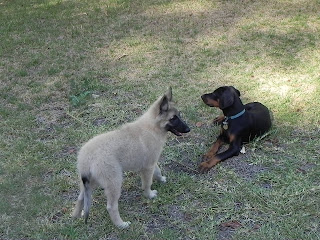Well, yes, I can see that those legs have rather got ahead of the rest of the body. And already, when Simon goes to the park, he's getting fewer cuddles and coos. It would seem, according to Hal Herzog's invaluable Some We Love, Some We Hate, Some We Eat, that this is normal -- sad, but normal. Someone with more research grants than they could sensibly spend did a test:
University of California at Santa Barbara researchers were interested in changes in the attractiveness of a golden retriever puppy named Goldie as she matured. Over a five-month period, they took Goldie to a highly traveled spot on campus where she would sit for an hour with her 'owner' (actually an assistant in the study), while the researchers tallied the number of passersby who came over to pet or play with her. Goldie's ability to seduce strangers decreased precipitously as she transitioned from puppy to adult. Her drop in popularity was especially steep among women. When Goldie was at her cutest, women were twice as likely as men to chat her up. But by the end of the study, the number of women who stopped to stroke her head and say hi had dropped 95%, and the sex difference had completely disappeared.Alas, poor Goldie. And alas anybody (over, say twenty-four) who makes a habit of seducing strangers. Of course, the study only proved what we know, which is that, well, in the words of the song, we all lose our charms in the end. Also, in the words of another song, la donna e mobile.
There's a poem by Robert Frost that is (tangentially) related to the topic. It's called
The Span of Life
Of course, as always with Frost, it's the human perspective that interests him: the poem is not really about the dog's span of life, but about the speaker's -- or rather, it's about the interaction between the two spans. I can remember what the dog can't because I have a longer span -- but that doesn't mean that my span is unlimited. There's a theory that all sorrow is in effect a mourning for our own death, that we find tragedies sad because we see in them an image of all mortality, which is to say our own. It's beautifully expressed by G.M Hopkins in his poemThe old dog barks backward without getting up.
I can remember when he was a pup.
Spring and Fall
(To a young child)
Margaret, are you grievingWell, poor Margaret, having that lot dumped on her. And poor readers of this blog, ending up with the gloomy topics again. The photographs will have to make up for the verbal content. Here's Simon with Thomas (his junior by all of five days), a Belgian Shepherd who came to call. It's what Sylvia Plath called, admittedly thinking of a human baby, 'A common-sense/ Thumbs-down on the dodo's mode' ( a thumbs-down this blog is sorely in need of):
Over Goldengrove unleaving?
Leaves, like the things of man, you
With your fresh thoughts care for, can you?
Ah! As the heart grows older
It will come to such sights colder
By and by, nor spare a sigh,
Though worlds of wanwood leafmeal lie;
And yet you will weep and know why.
Now no matter child, the name:
Sorrow's springs are the same.
Nor mouth had no nor mind expressed
What heart heard of, ghost guessed:
It is the blight man was born for,
It is Margaret you mourn for.
And no, you needn't remind me of what happened to Sylvia Plath.








I used to know Margaret by heart in my late teens. Two days ago - and 40 years on - as I mused on the various erosions of those 40 years - I tried to recite it. Got to 'Nor mouth had.../...ghost guessed' and got stuck. Just couldn't get the lines, so jumped to the last two lines; so unbearably memorable.
ReplyDeleteHowever, what I'd like is an explication of Plath's line. I think I get it - something like 'Common sense tells you creatures quite that cute (S and T), by the response they elicit, will guarantee their own perpetuation, i.e. will not become extinct like the dodo.' Is that it?
It would be convenient if it meant that, because it would link nicely with the idea I've mooted before, that cuteness has survival value. But I don't think that's what it does mean. The line is from a poem called 'Metaphors', in which Plath plays around with metaphors for pregnancy and then, here, for the unborn baby. So I think she simply means that the unborn baby is in itself a self-evident stay against extinction.
ReplyDeleteCorrection: the poem is not 'Metaphors', but 'You're'. The rest stays the same, though.
ReplyDelete